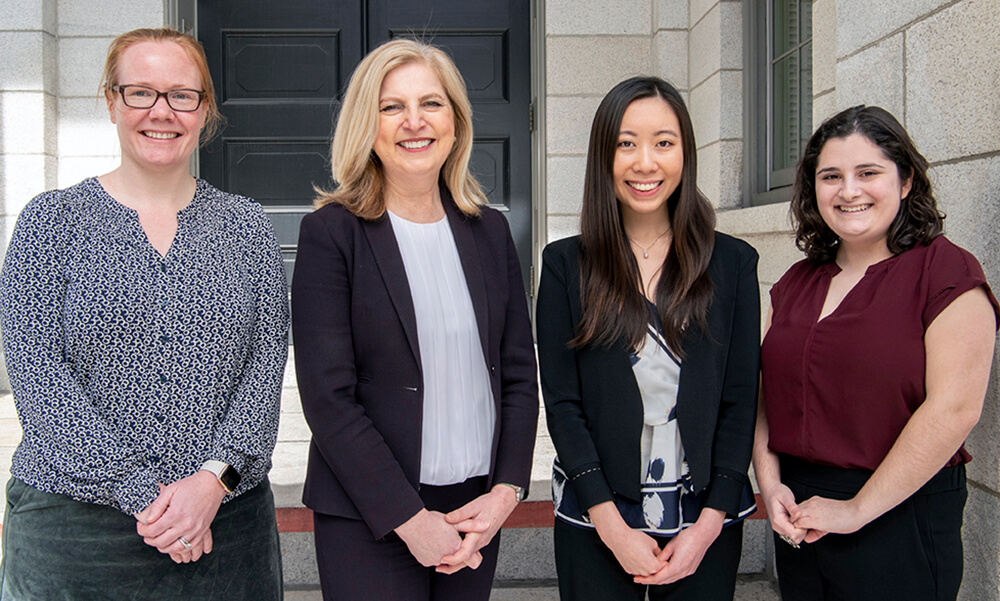Klinefelter Syndrome Clinic


Contact Information
Klinefelter Syndrome Clinic
Yawkey Center for Outpatient Care
32 Fruit Street, Suite 6C
Boston,
MA
02114
Phone: 617-726-5521
Fax: 617-726-1566
Klinefelter Syndrome Clinic
Yawkey Center for Outpatient Care
32 Fruit Street
Suite 6C
Boston, MA 02114
Near Public Transit
Accessible
To schedule an initial evaluation (your first appointment with our clinic), please contact our Clinic Coordinator at 617-726-5521.
If you have already been seen in our clinic and would like to schedule a follow-up specialty appointment (for example, endocrinology, urology, etc.), or would like to schedule one on the same day, our Clinic Coordinator will assist you in contacting them. Understandably, different specialty clinics may meet on different days.
Please see Visitor Information for driving directions, a map of the hospital, hotels (PDF), dining options and more.
Explore This Clinic
Overview
The MassGeneral Hospital Klinefelter Syndrome Clinic takes a multidisciplinary approach to providing quality, coordinated care to individuals of all ages living with Klinefelter syndrome. We are a subspecialty program, which means that we do not offer routine primary care but instead we offer our patients a comprehensive evaluation, specific to the needs of people with Klinefelter syndrome. Our doctors work with patients’ primary care providers to identify specialty needs, to coordinate care, and to improve outcomes.
Our multidisciplinary clinic was inspired by patient feedback, and it is our hope that those living with Klinefelter syndrome can consider our clinic a “medical home.” We welcome all those living with Klinefelter syndrome and offer a wide range of providers.
About This Program
In order to provide up-to-date care for people with Klinefelter syndrome, we take an evidence-based approach to care, informed by clinical and scientific research publications. Additionally, we emphasize the establishment of a care plan so that patients may effectively coordinate with all healthcare providers, even at institutions outside Mass General Brigham.
We believe in the development of an ongoing relationship with our patients, aided by periodic visits to our clinic. Dr. High in Genetics and Dr. Hayes in Reproductive Endocrinology will serve as first points of contact. From there, patients and their families may establish subspecialty care with other providers.
Age-appropriate Care
We work as a team to help those with Klinefelter syndrome and their families transition from prenatal consultation to infancy to adolescence, and through adulthood and their senior years. Our approach is customized to the age of the patient and their specific needs. Although many people with Klinefelter syndrome receive diagnoses later in life, we provide care across the lifespan.
Infants through Childhood
Birth – age 13
In the pediatric years, the emphasis is on addressing learning and behavioral challenges and on identifying physical differences (such as genital problems) that may benefit from surgery or other intervention as needed.
Adolescents and Young Adults
Age 14-22
The focus of care shifts to address issues related to puberty, weight, and metabolism, as well as initiating testosterone replacement therapy as needed. This will look different for every patient, and thus care will be individualized to meet specific needs of the patient.
Adults
We also welcome adult patients, who we may meet in a variety of ways. Some adult patients in our clinic are referred because of infertility evaluations, whereas others may have known for a longer period about their Klinefelter syndrome diagnosis and wish to seek counseling on parenthood and their overall health.
In addition to fertility-related care, we provide multispecialty, coordinated care, even throughout the most senior years.
Our Services
- Medical Genetics and Genetic Counseling
- Pediatric Endocrinology
- Reproductive Endocrinology
- Urology (pediatric and adult)
- Neuropsychology
- Psychiatry
We can also facilitate referrals to other specialists as needed.
Patient Resources
Our Multidisciplinary Team
With joint leadership between Medical Genetics and Reproductive Endocrinology, we have assembled a multidisciplinary team of medical, surgical, and neuropsychological specialists. Additional providers may be seen by referral through our program.
Co-Directors
Frances Hayes, MB BCh, BAO
Reproductive Endocrinologist
Frances High, MD, PhD
Medical Geneticist
Genetic Counseling
Ashley Wong, MS, CGC
Pediatric Endocrinology
Neuropsychology (Psychology Assessment Center)
Psychiatry
Amy Newhouse, MD
Neuropsychiatrist
Urology
Ajay Nehra, MBBS
Senior Urologic Surgeon
Research
At Mass General Hospital, we integrate clinical practice and scientific innovation to provide cutting edge care for our patients.
Research Activities from Our Co-Directors
Frances High, MD, PhD, Medical Genetics
Frances Hayes, MB BCh BAO, Reproductive Endocrinology
Clinical Practice Guidelines and Research Articles
Testosterone Therapy for Hypogonadism: Although not specific to Klinefelter syndrome, these guidelines provide an outline of the current recommendations in treating hypogonadism (one feature of Klinefelter syndrome.)
Patient Education and Resources
Klinefelter syndrome is a genetic condition in which boys are born with an extra copy of the X chromosome (XXY). This condition may lead to various medical problems, which may include small testes, infertility, and learning and mental health challenges. However, not everyone experiences the same problems. Most people with Klinefelter syndrome lead healthy lives with proper medical care and education.
Klinefelter Syndrome: What You Need to Know
Organizations and Websites
The Association for X and Y Chromosome Variations (AXYS): AXYS is an advocacy, education and support organization for individuals with X and Y chromosome variations and their families.
Living with XXY: Blogger and Klinefelter syndrome advocate Ryan Bregante shares his story and advice about living with Klinefelter syndrome.
National Human Genome Research Institute: Klinefelter Syndrome
The Hormone Foundation: Klinefelter Syndrome
Genetic and Rare Diseases (GARD) Information Center: Klinefelter Syndrome
Schedule a Virtual or Telephone Visit
Care teams across Mass General for Children are available to provide care via phone or online video visits. Call 888-644-3248 to learn more.

